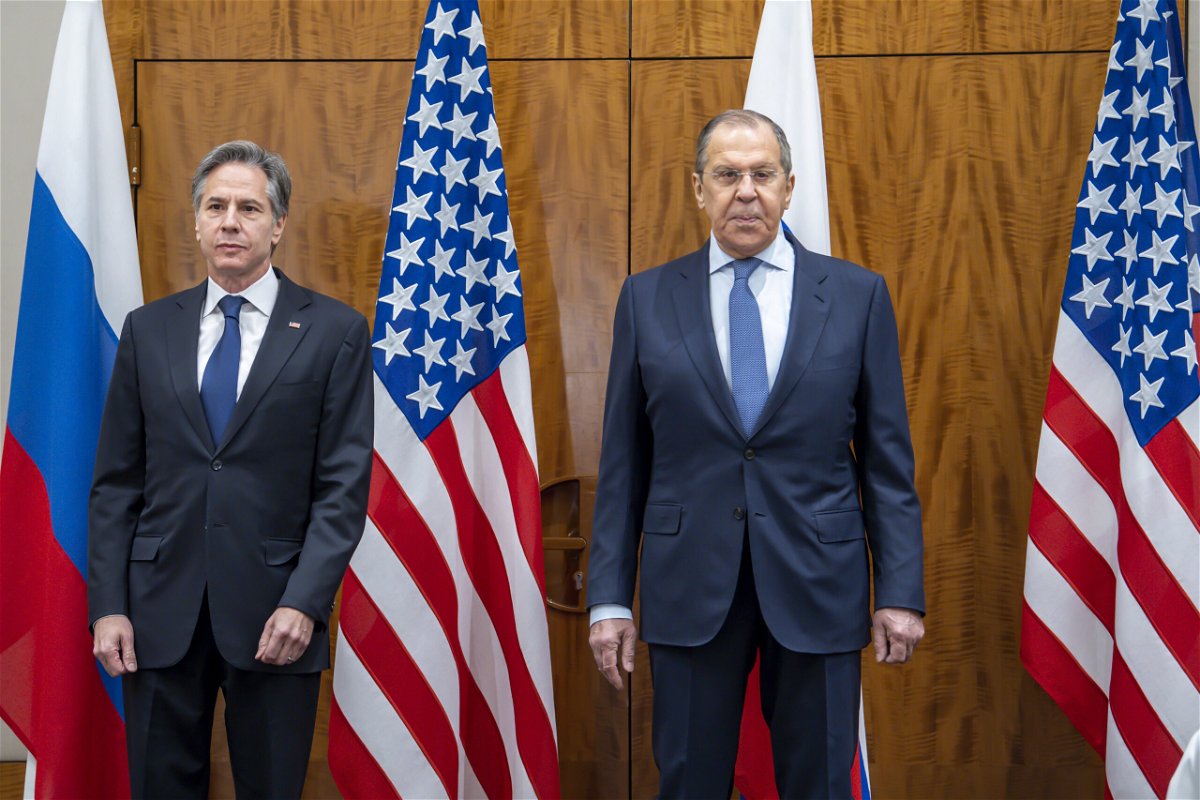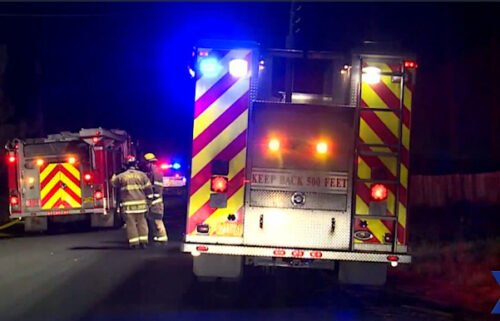Call between top US and Russian diplomats doesn’t ratchet down Ukraine tensions

U.S. Secretary of State Antony Blinken
By Jennifer Hansler, Kylie Atwood and Jeremy Herb, CNN
Russian Foreign Minister Sergey Lavrov did not give an indication that Moscow will de-escalate from the border with Ukraine in a call with Secretary of State Antony Blinken Tuesday, a senior State Department official said following the latest diplomatic effort between the two sides amid the threat of a Russian invasion of Ukraine.
The official said the phone conversation between the two top diplomats lasted about 30 minutes and they described the tone as “professional and fairly candid.”
The call between Blinken and Lavrov came one day after a tense UN Security Council meeting where the US and Russia traded accusations over Moscow’s escalations on the Ukrainian border, where Russia has massed thousands of troops.
Blinken told Lavrov that if Russian President Vladimir Putin “does not intend war or regime change,” then it was time to pull back troops and heavy weaponry and engage in serious, diplomatic discussions, the official said.
Lavrov responded that the escalation that the US was claiming was not occurring, the official said, but that it was merely Russia moving troops within its own borders. Blinken raised Russia’s troops buildup in Belarus — which US officials said could reach 30,000 by early February — but there was not an “extensive” exchange on it, according to the official.
Blinken reiterated the US commitment to pursuing diplomacy, officials and State Department spokesman Ned Price said, and the two top diplomats agreed they should speak again after the US receives a formal written reply from Moscow, which Putin would review.
In Moscow Tuesday alongside Hungarian Prime Minister Viktor Orban, Putin made his first public comments in weeks, saying that the written responses from the West had “ignored” Russia’s main security concerns.
Russia has demanded that NATO commit to never admitting Ukraine and that NATO countries pull back troops and military equipment from Eastern European countries admitted to NATO since 1997, including Romania and Bulgaria. The US and NATO have said these demands violate NATO’s open-door policy and are non-starters in negotiations with Moscow.
‘Serious differences’
According to Price’s written readout of the call, Blinken “further reiterated the US commitment to Ukraine’s sovereignty and territorial integrity, as well as the right of all countries to determine their own foreign policy and alliances.”
At a press briefing Tuesday afternoon, Price did not respond to any specific remarks made by Putin, while saying that the US remains focused on the formal response from the Kremlin that will be coming in a matter of days or weeks.
“We heard from President Putin a variety of things. I will leave it to the Kremlinologists out there, budding, professional, amateur or otherwise, to read the tea leaves and try to interpret the significance of those remarks,” Price said. “For our part, we don’t necessarily need to do that because we know that a formal response from the Russian Federation is forthcoming. We heard that again today from Foreign Minister Lavrov.”
Once the US receives the written response from Russia, they will chart the diplomatic path forward,” Price said.
The US did receive a written response from Russia on Monday, but the Kremlin said Tuesday that it was not its “main reply” to the US over Russia’s security concerns, saying there had been a “mix-up.”
Russia’s foreign ministry released the text the letter Tuesday, which it said was given to the United States, Canada and several European countries.
In the letter, Lavrov wrote that the US and NATO responses to Russia’s proposals “demonstrate serious differences in the understanding of the principle of equal and indivisible security that is fundamental to the entire European security architecture.”
A second senior official said that the “continued engagement on the Russian side is evidence” that Russia has not fully shut the door on diplomacy.
“I do think they agree that ideas in those in that non paper could be the basis for a constructive conversation about how you enhance security in Europe,” they said.
Several European diplomats told CNN they will be watching closely to see what happens on the diplomatic track in the coming weeks. Blinken spoke with top officials at NATO, the European Union, and the Organization for Security and Cooperation in Europe (OSCE) following his call with Lavrov, and they “agreed to continue to coordinate closely and committed to seek a diplomatic solution to prevent further aggression against Ukraine,” according to a State Department readout.
‘Holding a gun’
British Prime Minister Boris Johnson traveled to Ukraine Tuesday, where he met in Kyiv with Ukrainian President Volodymyr Zelensky. At a news conference, Johnson portrayed Russia’s escalation as a threat not just to Ukraine but to all of NATO and Europe.
“Vladimir Putin is trying, by holding a gun, intimidating Ukraine, to get us to change the way we look at something that was fantastic,” Johnson said of NATO. “What is happening now is President Putin is trying to undermine those gains and re-draw the security map of Europe and new zones of influence. It wouldn’t be just Ukraine, it would be Georgia, Moldova — this moment is critical.”
There have been some differences within NATO over how to respond in the event of Russian action in Ukraine — which President Joe Biden alluded to at his news conference last week. Biden and Zelensky also clashed in a phone call last week over US rhetoric saying an invasion was “imminent.”
However, US officials and European diplomats have said there is broad consensus about the threat and the need to be prepared to respond in a significant way if Russia invades.
One European diplomat said they “would not use the word rift” to describe the differences on possible sanctions between the US and its European allies.
“There are clearly differences and there are clearly national interests being looked after, all of which is was entirely predictable,” they said.
The diplomat noted that it makes sense to deliberately keep quite a bit of ambiguity in public communication about what the consequences could be, but it’s a difficult balance to strike because if one is too general, then the of the threat might appear less credible to the Russian leadership.
“I think I think it wouldn’t hurt to be a little bit more specific for sure,” the diplomat said.
This story has been updated with additional reporting and background information.
The-CNN-Wire
™ & © 2022 Cable News Network, Inc., a WarnerMedia Company. All rights reserved.



